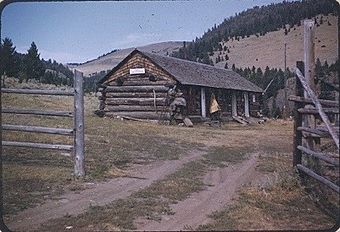Eagle Guard Station facts for kids
Quick facts for kids |
|
|
Eagle Guard Station
|
|

Eagle Guard Station in 1956
|
|
| Lua error in Module:Location_map at line 420: attempt to index field 'wikibase' (a nil value). | |
| Nearest city | 11 miles west of Townsend, Montana |
|---|---|
| Area | 90 acres (36 ha) |
| Built | 1895 |
| Built by | Owens, Dick; Wilson, Jack |
| Architectural style | Cabin |
| NRHP reference No. | 01001014 |
| Added to NRHP | September 20, 2001 |
The Eagle Guard Station is a special place listed on the National Register of Historic Places. This means it's an important historical site in the United States. It's found about 11 miles west of Townsend, Montana. This historic station was added to the Register on September 20, 2001.
Contents
Discover the Eagle Guard Station
The Eagle Guard Station is a very old log cabin. It has a long history in the forests of Montana. It's a great example of early buildings used by forest rangers.
Building the Station
The Eagle Creek Ranger Station was first built in 1895. Two people named Richard (Dick) Owen and Jack Wilson built it. They created this cabin over a hundred years ago.
A New Purpose for the Cabin
In 1905, a large area called the Elkhorn Forest Reserve was created. A few years later, in 1908, the Helena National Forest was formed. Around this time, the U.S. Forest Service took over the Eagle Cabin. They started using it for their official work. This is called "administrative use."
Connecting the Stations
The Eagle Station was very important. It was connected by a telephone line to other stations. These included the Tizer and Glendale stations. All these lines went to a switchboard in a store in Radersburg. This helped rangers communicate across the forest.
The Oldest Cabin in the Forest
The Eagle Cabin is the oldest log building of its kind in the Helena National Forest. It was built even before the forest itself was officially established! The Forest Service used Eagle Station regularly until the early 1950s.
Who Else Used the Cabin?
After the Forest Service stopped using it daily, others still found it useful. Riders from the Crow and Indian Creek Livestock Association used the cabin. They continued to use it for many years, even up until the 1970s.
 | Charles R. Drew |
 | Benjamin Banneker |
 | Jane C. Wright |
 | Roger Arliner Young |

